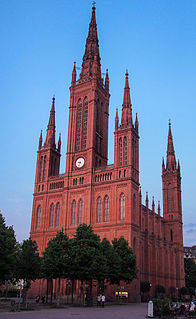
The Lutherkirche is one of four main Protestant churches in Wiesbaden, the capital of Hesse, Germany. It was built between 1908 and 1910 in Jugendstil and in accordance with the Wiesbadener Programm, to a design by Friedrich Pützer. With two organs and good acoustics, it is also a concert venue.
Andreas Karasiak is a German classical tenor in opera and concert.

The Reger-Chor is a German-Belgian choir. It was founded in Wiesbaden in 1985 and has been conducted by Gabriel Dessauer in Wiesbaden. Since 2001 it has grown to Regerchor-International in a collaboration with the organist Ignace Michiels of the St. Salvator's Cathedral of Bruges. The choir performs an annual concert both in Germany and Belgium of mostly sacred choral music for choir and organ. Concerts have taken place regularly in St. Bonifatius, Wiesbaden, and in the cathedral of Bruges in its series "Kathedraalconcerten". The choir performed additional concerts at other churches of the two countries and in the Concertgebouw of Bruges.

Gabriel Dessauer is a German cantor, concert organist and academic. He has been responsible for the church music at St. Bonifatius, Wiesbaden from 1981, conducting the Chor von St. Bonifatius until 2018. He is an internationally known organ recitalist and was an organ teacher on the faculty of the Hochschule für Musik Mainz. In 1985, he founded the German-English project choir Reger-Chor. He has lectured at international conferences, especially about the music of Max Reger, who was a member of the parish St. Bonifatius.
Markus Flaig is a German bass-baritone who has focused on concerts and recordings of sacred music.
Konrad Jarnot is an English baritone who works in opera and oratorio and is a notable performer of Lieder. He is a professor at the Robert Schumann Hochschule.

Marktkirche is the main Protestant church in Wiesbaden, the state capital of Hesse, Germany. The neo-Gothic church on the central Schlossplatz was designed by Carl Boos and built between 1853 and 1862. At the time it was the largest brick building of the Duchy of Nassau. It is also called Nassauer Landesdom.

Schiersteiner Kantorei is a German concert choir, founded in 1962 at the Christophoruskirche in Wiesbaden-Schierstein. The choir performs regularly in the Marktkirche, Wiesbaden, and in Eberbach Abbey. It is known internationally through its tours and recordings. The choir was awarded the Culture Prize of the City of Wiesbaden in 1990.

Martin Lutz is a German musicologist, conductor and harpsichordist. He was the musical director of the concert choir Schiersteiner Kantorei in Wiesbaden from 1972 to 2017, and founded the biennial festival Wiesbadener Bachwochen in 1975.

The Christophoruskirche is a Protestant church in the borough of Schierstein, Wiesbaden, Germany. It was built in 1752 to 1754 in the style of the late Baroque and Rococo.

The Chor von St. Bonifatius is a German mixed choir, the church choir of the parish St. Bonifatius, Wiesbaden. It was founded in 1862 as a male choir and was a mixed choir from 1887. From 1981 to 2018, it was conducted by Gabriel Dessauer, who founded two children's choirs. The group sang the first performance in Germany of John Rutter's Mass of the Children and performed in Azkoitia, San Sebastián, Görlitz, Bruges, Macon and Rome. Colin Mawby composed for the choir the Missa solemnis Bonifatius-Messe for the 150th anniversary, celebrated on 3 October 2012. From 2019, the choir has been conducted by Roman Twardy who conducted in his first concert Dvořák's Stabat Mater.

Erhard Egidi was a German cantor, organist and composer of sacred music. He was Kantor at the Neustädter Kirche, Hannover, from 1972 to 1991, where he focused on music in church services, but also conducted concerts, with a preference for works of Johann Sebastian Bach and his own teacher Ernst Pepping. He was appointed Kirchenmusikdirektor, responsible for the church music of Hanover.
Georg Poplutz is a German tenor, a soloist in Baroque music, opera and oratorio, and a Lied singer. He has been a member of vocal ensembles such as Johann Rosenmüller Ensemble and Cantus Cölln, and has participated in a project to record the complete works of Heinrich Schütz.

Rheingauer Kantorei, now Neue Rheingauer Kantorei, is a mixed choir of the Rheingau region in Germany, performing mostly sacred music in services and concerts.
Frank Stähle was a German musician, a choral conductor and the director of Dr. Hoch's Konservatorium in Frankfurt from 1979 to 2007.

The Bergkirche is one of four main Protestant churches in Wiesbaden, the capital of Hesse, Germany. It was completed in 1879 in Gothic Revival based on a design by Johannes Otzen. The church is focused on having the altar and pulpit close to the congregation, following Luther's concept of a universal priesthood. It also serves as a concert venue for church music.

Klaus Uwe Ludwig was a German church musician, concert organist and composer, who directed the church music at the Lutherkirche in Wiesbaden for decades.

Johannes Hill is a German baritone in concert and in oratorios, who has performed internationally. Singing in choirs from age 10, he has performed major roles in oratorios, such as both Jesus and Pilate in Bach's Passions, and Pope Francis in the premiere of Laudato si'. He has also performed in vocal ensembles such as Kammerchor Stuttgart and Collegium Vocale Gent.
The Wiesbadener Knabenchor is a mixed boys' choir founded in 1960 in Wiesbaden, the capital of Hesse, Germany. First a parish choir at the Ringkirche, it developed into a concert choir which has appeared internationally in countries such as Bulgaria, Malaysia and Australia, and has made recordings.

Roman Twardy is a German teacher, academic lecturer and the conductor of the Wiesbadener Knabenchor boys' choir in Wiesbaden, Hesse, Germany. The choir appears internationally and has made recordings. From 2019, Twardy is also interim conductor of the church choir Chor von St. Bonifatius in Wiesbaden.













